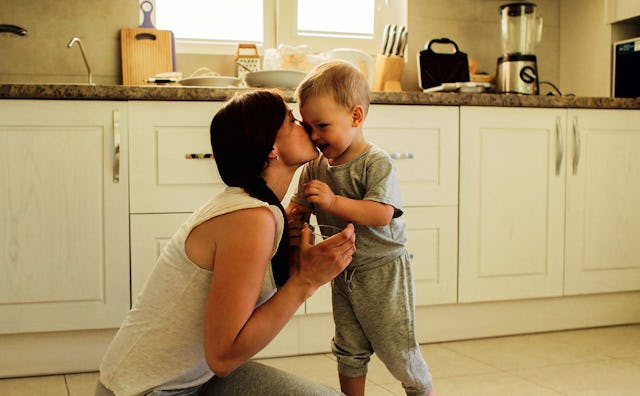What Is The 'Value' Of Being A SAHM?

When my first child was an infant, I was offered a job that would have been perfect for me, career-wise: an editorial job, decent paycheck, about 45 hours a week. Well, perfect for the pre-kid me, that is. With a 3-month-old, it seemed like a series of obstacles to hurdle: the prohibitive cost of child care, the pumping, the commute. I knew that parents did it (some of them even made it look easy), but the very idea of the juggling act seemed overwhelming. It left a knot in my stomach, a knot of anxiety and sadness. And so I stayed home, save the occasional freelance job here and there, until my second child was weaned.
Every now and then, I’d run across articles with alarming headlines, like “It Would Be Easier for Dinosaurs to Come Back to Life Than for SAHMs To Re-Enter The Workforce,” or “The Cost of Your Staying at Home, Over a Lifetime, Is Roughly 83 Million Dollars,” and I’d doubt my decision. But I’d think about that knot in my stomach and conclude, once again, that the knot just wasn’t worth it.
It turns out that I’m not the only one thinking with my gut about what is usually a dollars-and-cents problem. In The New York Times, Carl Richards offers an intriguing way of calculating the value of these decisions: an “emotional balance sheet.” Rather than listing the costs and benefits of working versus not working, e.g., the paycheck, commuting, office clothes, day care, etc., we should be writing down the emotional costs and benefits of our decisions. This exercise can provide clarity and hopefully some measure of peace about the decisions we’ve made—even if they’re not necessarily the ones that are going to leave us with the most money.
All parents know that the question of whether to work or stay home is a complex and emotionally fraught decision. And it’s complicated by the fact that for most of us, it isn’t a “choice” at all: Some of us can’t afford to not work, and so are back on the job soon after a baby arrives, and some of us can’t manage to find child care affordable enough to make working “worth it.” (In Richards’s otherwise excellent essay about his wife’s decision to forgo a career that might have netted her about $63,000 a year—a loss for their household in the millions over her lifetime—he never mentions the hideous cost of child care. A nanny for their four children would have taken a huge chunk out of their combined salaries.)
It’s comforting to think that decisions we’ve made from our guts—listening to that knot of anxiety and sadness—are actually accounting for value. It’s just a different kind of value: the kind of value that might lead a person to become a teacher instead of a hedge-funder, for example. When you ask yourself these questions: Do I want to be a teacher, do I want to stay home with my kids, do I want to spend $40 a week on music lessons, do I want to take a trip to Europe—you’re actually saying to yourself, What kind of life do I want to live?
When my first son was an infant, the life I wanted to live was home doing the nitty-gritty of child care. By the time my second child arrived, I was offered another job, and this time there was no knot in my stomach. We found terrific child care easily (though the expense is still hideous). There was no commute and no pumping.
But the bigger thing was that I wanted to go back to work. It felt like the right time; all the hurdles were much easier to jump. This time around, the value of working was higher and the value of staying home was lower—even though the dollars and cents were pretty much the same.
Every decision has pros and cons, and if you draw up a balance sheet based only on numbers, it technically makes sense to work even if you net only $4 a year after you pay for day care (which would have been the case if I’d taken the first job). But mothers’ happiness has a value too, and our happiness has a knock-on effect for our kids. A household is an ecosystem, and our roles within the ecosystem affect one another’s health and well-being: A strung-out parent, or parents, means a household that’s under strain. That should be accounted for on our balance sheets: If I value staying home, my happiness is going to have a positive effect on the rest of the family. If I value working, same thing.
After all, as Richards points out, if you only consider the money, having kids at all is a bad decision: “If we limit our view to what can be measured in dollars, most of what brings us happiness could be defined as bad financial decisions.” But if you value having a family, it’s priceless.
This article was originally published on